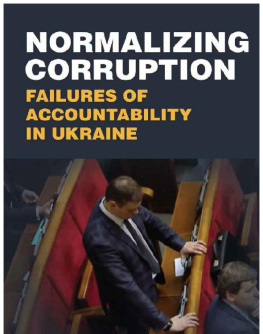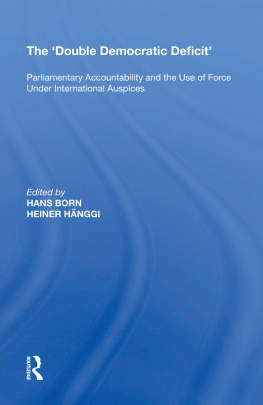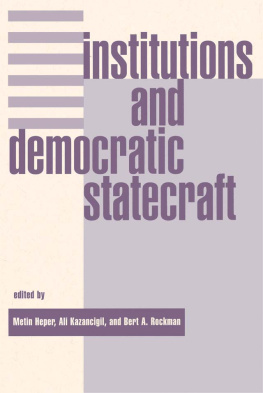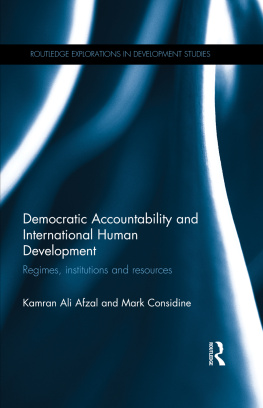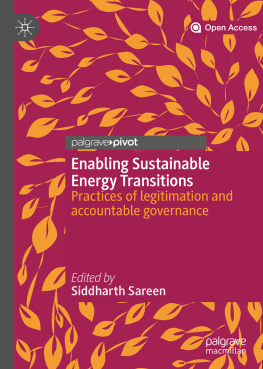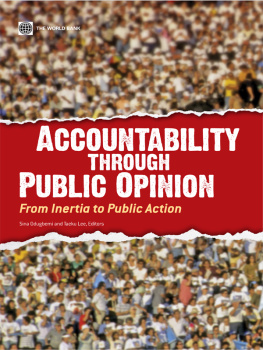Normalizing Corruption
Failures of Accountability in Ukraine
ERIK S. HERRON
Copyright
University of Michigan Press Ann Arbor
Copyright 2020 by Erik S. Herron
All rights reserved.
For questions or permissions, please contact
Published in the United States of America by the University of Michigan Press Manufactured in the United States of America Printed on acid-free paper First published September 2020
A CIP catalog record for this book is available from the British Library.
Library of Congress Cataloging-in-Publication Data Names: Herron, Erik S., 1968- author.
Title: Normalizing corruption: failures of accountability in Ukraine / Erik S. Herron. Description: Ann Arbor: University of Michigan Press, 2020. | Series: Weiser Center for Emerging Democracies series | Includes bibliographical references and index. Identifiers: LCCN 2020013384 (print) | LCCN 2020013385 (ebook) | ISBN 9780472132140 (hardcover) | ISBN 9780472127146 (ebook)
Subjects: LCSH: Government accountabilityUkraine. | Political corruptionUkraine. | DemocratizationUkraine. | UkrainePolitics and government1991-Classification: LCC JN6635.A55 A335 2020 (print) | LCC JN6635.A55 (ebook) |
DDC 364. 1/32309477dc23 LC record available at https://lccn.loc.gov/2020013384 LC ebook record available at https://lccn.loc.gov/2020013385
Cover illustration: Screen-captured image from a video taken by the Ukrainian nongovernmental organization Chesno. Used by permission.
Series Editor
Dan Slater is Professor of Political Science, Ronald and Eileen Weiser Professor of Emerging Democracies, and Director of the Weiser Center for Emerging Democracies (WCED) at the University of Michigan.
The Weiser Center for Emerging Democracies (WCED) Series publishes cutting-edge research in the pivotal field of authoritarianism and democratization studies. We live in a historical moment when democracies seem increasingly fragile and authoritarian regimes seem stubbornly resilient across the globe, and these topics continue to be a central part of research in the social sciences. The WCED Series strives to collect a balance of titles on emerging democracies and enduring dictatorships, as one cannot understand the conditions under which democracies live and thrive without comprehending how they die and remain unborn.
The WCED Series is interested in the full range of research being conducted on authoritarianism and democratization, primarily in political science but at times from history, sociology, and anthropology as well. The series encompasses a global geographic reach. We invite works that are primarily qualitative as well as quantitative in approach and are interested in edited volumes as well as solo-authored manuscripts.
The series highlights the leading role of the University of Michigan Press, Weiser Center for Emerging Democracies, and International Institute as premier sites for the research and production of knowledge on the conditions that make democracies emerge and dictatorships endure.
Normalizing Corruption: Failures of Accountability in Ukraine Erik S. Herron
Economic Shocks and Authoritarian Stability: Duration, Financial Control, and Institutions Victor C. Shih, Editor
Electoral Reform and the Fate of New Democracies: Lessons from the Indonesian Case Sarah Shair-Rosenfield
Campaigns and Voters in Developing Democracies: Argentina in Comparative Perspective Noam Lupu, Virginia Oliveros, and Luis Schiumerini, Editors
CONTENTS
Digital materials related to this title can be found on the Fulcrum platform via the following citable URL: https: //doi. org/10. 3998/mpub. 11596348
ACKNOWLEDGMENTS
This book distills two decades of my research on Ukrainian politics. While it lists only one author, it is truly a collaboration with dozens of scholars, nongovernmental organizations, and government officials in the United States, Ukraine, and elsewhere. While I am responsible for any errors, omissions, or misinterpretations, I owe a great debt to these colleagues for many insightful observations and access to critical data.
My departmental colleagues at the University of Kansas (where I was on the faculty from 2001 to 2014) and West Virginia University (where I am currently on the faculty) always engaged me in valuable conversations, which sparked many of the ideas I explore in this book. At the University of Kansas, Paul Johnson and the late Ronald Francisco regularly talked with me about my research, providing constructive criticism and encouragement. At West Virginia University, I received valuable feedback from Jay Krehbiel, Mason Moseley, Matthew Wilson, and graduate students in the Comparative Politics Research Workshop. I am also grateful to the 2016 PONARS Eurasia Conference at the University of Helsinki, as well as discussants and audience members at several annual meetings of the Midwest Political Science Association and American Political Science Association for ideas that helped hone my arguments and push me to improve the analysis.
The book also benefited from two grants funded by the National Science Foundation, one grant funded by the United States Department of Defenses Minerva Research Initiative, and generous gifts from the Walter J. and Gail B. Woolwine Faculty Travel Fund. The first grant, with principal investigators Ellis Krauss, Robert Pekkanen, and Matthew Shugart (SES0751662) focused on political-party personnel decisions and yielded valuable election data. The second grant generated data on election administration (SES1462110). The Minerva Research Initiative project (N0001419-1-2456), funded by the Office of Naval Research, addresses how states bordering hostile neighbors maintain state capacity and provide civilian services such as election administration. I am a principal investigator on this research project, along with Cynthia Buckley and Ralph Clem. The Wool-wine familys support for international research by WVU political science faculty allowed me to extend my work to encompass the most recent examples of vertical accountability: the election of President Volodymyr Zelensky and the victory of his party, Servant of the People, in 2019.
My research also benefited from the Fulbright Program and the opportunity to spend a semester at Ivan Franko National University in Lviv in 2007. I am grateful for the advice and support of Yurii Kyrylych, Viktor Krevs, Anatolii Romanyuk, and the late Yurii Shveda. I also worked on many of the papers that inspired this book during my tenure as a program director at the National Science Foundation (2011-2014). The NSFs Independent Research and Development support gave me time to advance my research while also serving as a program director.
Several people and organizations in Ukraine have been long-term partners on this project. I was fortunate to meet Nazar Boyko while I was on the Fulbright Fellowship in 2007. Tat interaction launched more than a decade of partnership on research about deputy requests, election administration, and electoral systems. His organization, CIFRA Group, and its staff (especially Roman Sverdan) have been essential collaborators. Due to my close association with CIFRA and its staff, I do not discuss its development and activities in detail, but it is one of the important civil society actors that I describe in chapter 5. Together with CIFRA, I was able to cooperate with the Kyiv International Institute of Sociology, the Central Electoral Commission of Ukraine, and the International Foundation for Electoral Systems on election administration research. This partnership has produced a substantial amount of research that informs the arguments in this book. I am also grateful to Oksana Stavniichuk, and the organization Chesno, who permitted me to use an image from one of their videos on the cover of this book.

